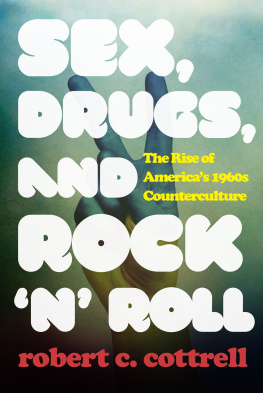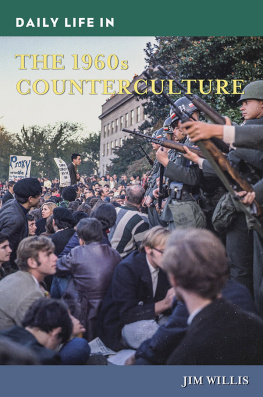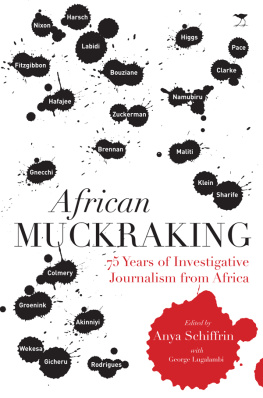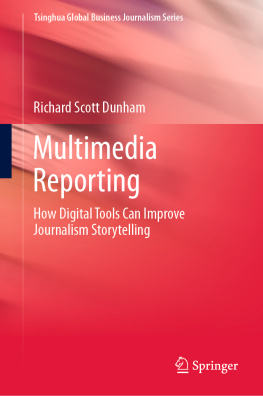ROUTLEDGE LIBRARY EDITIONS:
JOURNALISM
Volume 8
REPORTING THE
COUNTERCULTURE
REPORTING THE
COUNTERCULTURE
RICHARD GOLDSTEIN
First published in 1989
This edition first published in 2016
by Routledge
2 Park Square, Milton Park, Abingdon, Oxon OX14 4RN
and by Routledge
52 Vanderbilt Avenue, New York, NY 10017
Routledge is an imprint of the Taylor & Francis Group, an informa business
1989 Unwin Hyman, Inc.
All rights reserved. No part of this book may be reprinted or reproduced or utilised in any form or by any electronic, mechanical, or other means, now known or hereafter invented, including photocopying and recording, or in any information storage or retrieval system, without permission in writing from the publishers.
Trademark notice: Product or corporate names may be trademarks or registered trademarks, and are used only for identification and explanation without intent to infringe.
British Library Cataloguing in Publication Data
A catalogue record for this book is available from the British Library
ISBN: 978-1-138-80197-4 (Set)
ISBN: 978-1-315-68235-8 (Set) (ebk)
ISBN: 978-1-138-93002-5 (Volume 8) (hbk)
Publishers Note
The publisher has gone to great lengths to ensure the quality of this reprint but points out that some imperfections in the original copies may be apparent.
Disclaimer
The publisher has made every effort to trace copyright holders and would welcome correspondence from those they have been unable to trace.
Reporting
the Counterculture
RICHARD GOLDSTEIN
Boston
UNWIN HYMAN
LondonSydneyWellington
1989 by Unwin Hyman, Inc.
This book is copyright under the Berne Convention. No reproduction without permission. All rights reserved.
Unwin Hyman, Inc.
8 Winchester Place, Winchester, Mass. 01890, USA
Published by the Academic Division of
Unwin Hyman Ltd
15/17 Broadwick Street, London WIV 1FP, UK
Allen & Unwin (Australia) Ltd,
8 Napier Street, North Sydney, NSW 2060, Australia
Allen & Unwin (New Zealand) Ltd in association with the Port Nicholson Press Ltd,
Compusales Building, 75 Ghuznee Street, Wellington 1, New Zealand
First published in 1989.
Library of Congress Cataloging in Publication Data
Goldstein, Richard, 1944
Reporting the counterculture / Richard Goldstein.
p.cm. (Media and popular culture; 5)
Includes index.
ISBN 0-04-445238-1. ISBN 0-04-445239-X (pbk.)
1. JournalismSocial aspectsUnited StatesHistory20th century. 2. Mass mediaUnited StatesInfluenceHistory20th century. 3. United StatesSocial conditions1960-1980. 4. United StatesPopular cultureHistory20th century. I. Title.
II Series
PN4888.S6G65 1988
302.230973dc20 89-33757
CIP
British Library Cataloguing in Publication Data
Goldstein, Richard
Reporting the counterculture. (Media and popular culture).
1. American popular culture, history
I. Title II. Series
306.1
ISBN 0-04-445238-1
ISBN 0-04-445239-X Pbk
Typeset in 10 on 12 point Palatino and printed in Great Britain by Billing & Sons, London and Worcester
For Judith G. Hibbard,
who got me through it,
and Tony Ward,
who helped me remember.
________________
The vivid, subjective vignettes of the counterculture collected here have for me a greater force than any official history. Part anthropological artifact and part spiritual autobiography, these piecesculled mostly from Goldsteins articles and columns in The Village Voicetrace a passage from hopeful expectation to disillusionment that some will read as a reluctant and overdue maturing and others as a tragic or at least melancholy adjustment to historical reality.
The young author of these pieces has a keen sense of the absurd, and he understands the corrupt, extensive power exerted by those he calls (in a fine phrase from his witty essay on Antoine, the ersatz French Bob Dylan) the merchants of novelty. He is armed not with a fully developed politics but with an aesthetic of defiance and nonconformity grounded in the culture of rock music. The limits (though also the attractions) of such an aestheticized politics are a recurring subtext or lesson in these accounts of musicians, promoters, hippies, and political protestors. Implicit in nearly every essay, this theme emerges explicitly in the final sections of .
There isnt going to be any revolution, Country Joe MacDonald tells a shocked Goldstein in the troubled fall of 1968. Goldstein has come to rap about the revolution with the rock group that represents for him the essence of political commitment. Instead he encounters a powerful cynicism and candor. I dont know any authentic guerrillas, Country Joe remarks wearily, only a lot of people wearing Che Guevara tee shirts what a bunch of tripped-out freaks. Later in the same interview Country Joe strikes at the heart of our narrators already vulnerable politics: Musics nothing to believe in. I mean its just sound.
Goldsteins writing during the 1960s both reported on and participated in the distinctive forms of aesthetic experimentation that helped to define that volatile period. His book will have a double interest: as an accountan engaged, attentive portraitof some of the characteristic figures and events of the 1960s; and as an artifact itself, a significant instance of the New Journalism to which he refers in his introduction. The more violently subjective and fictionizing strains of this movementsuch as the work of Tom Wolfe or Hunter Thompsonare no doubt better known, but I believe Goldsteins more restrained (and less self-regarding) work has equal interest for us now. Fragmentary and intuitive, the pieces gathered here offer not a systematic but a richly evocative chronicle of a crucial moment in our recent past. They speak to us simultaneously as a commentary on that time and as an expression of it.
David Thorburn
________________
Among the many editors who made these pieces possible, I am especially grateful to Dan Wolfe, cofounder of the Village Voice. He gave me my first job in journalism, and encouraged my growth without directing it. Clay Felker was an unwavering supporter, first as the editor of New York Magazine, and later, when he purchased the Voice. Sy Peck nurtured my criticism in the New York Times, and Mary Cantwell was a generous friend at Conde Nast.
In addition, I want to thank David Thorburn for his exacting editing of the introductory essay, and Lisa Freeman for her faith in this unusual project. David Marc and Daniel Czitrom helped me to realize that my early work could have a life beyond its origins. My parents, Jack and Mollye Goldstein, held their breath until the sixties ended: perhaps this book will convince them that risk can sometimes bring reward.
The Lizard King is reprinted from







